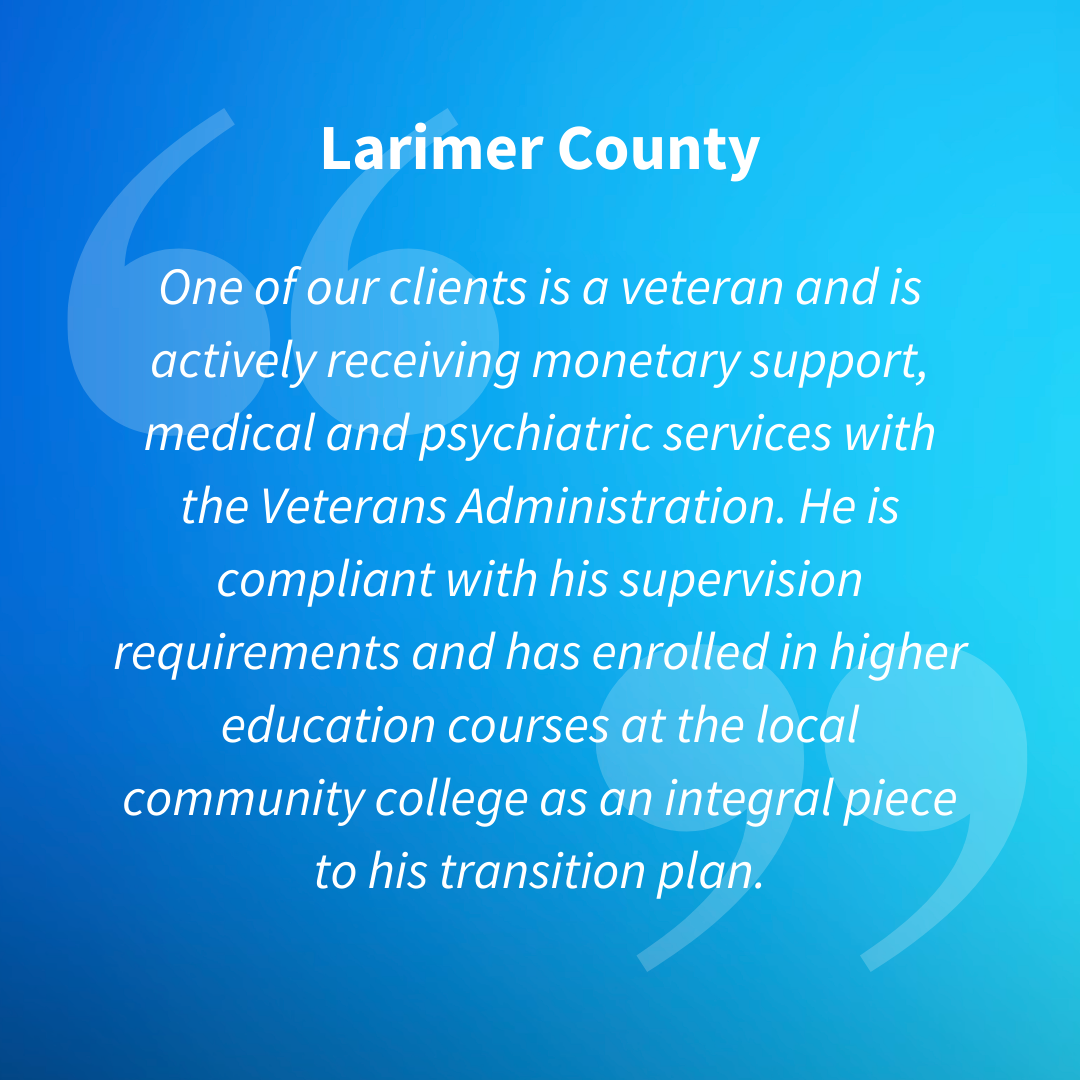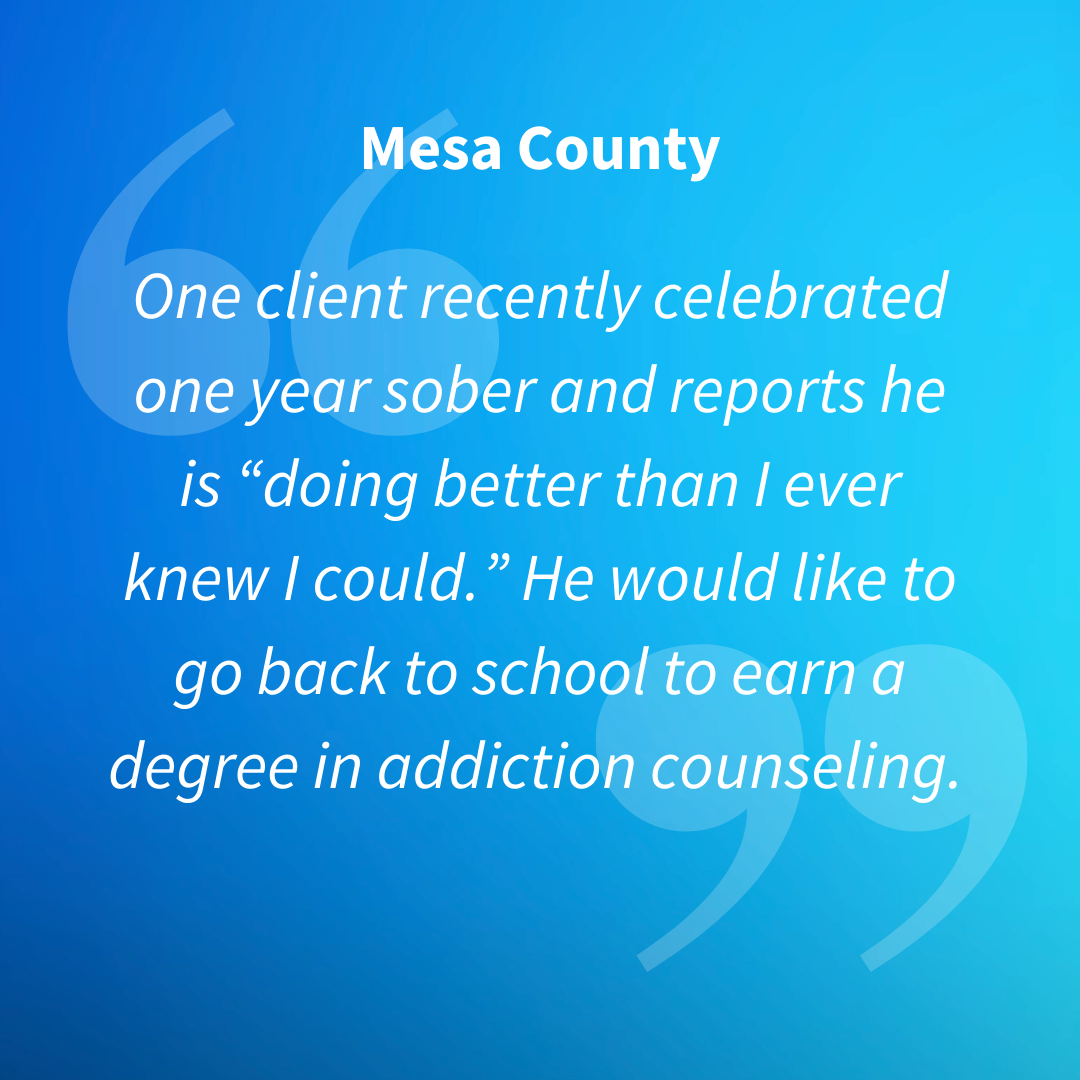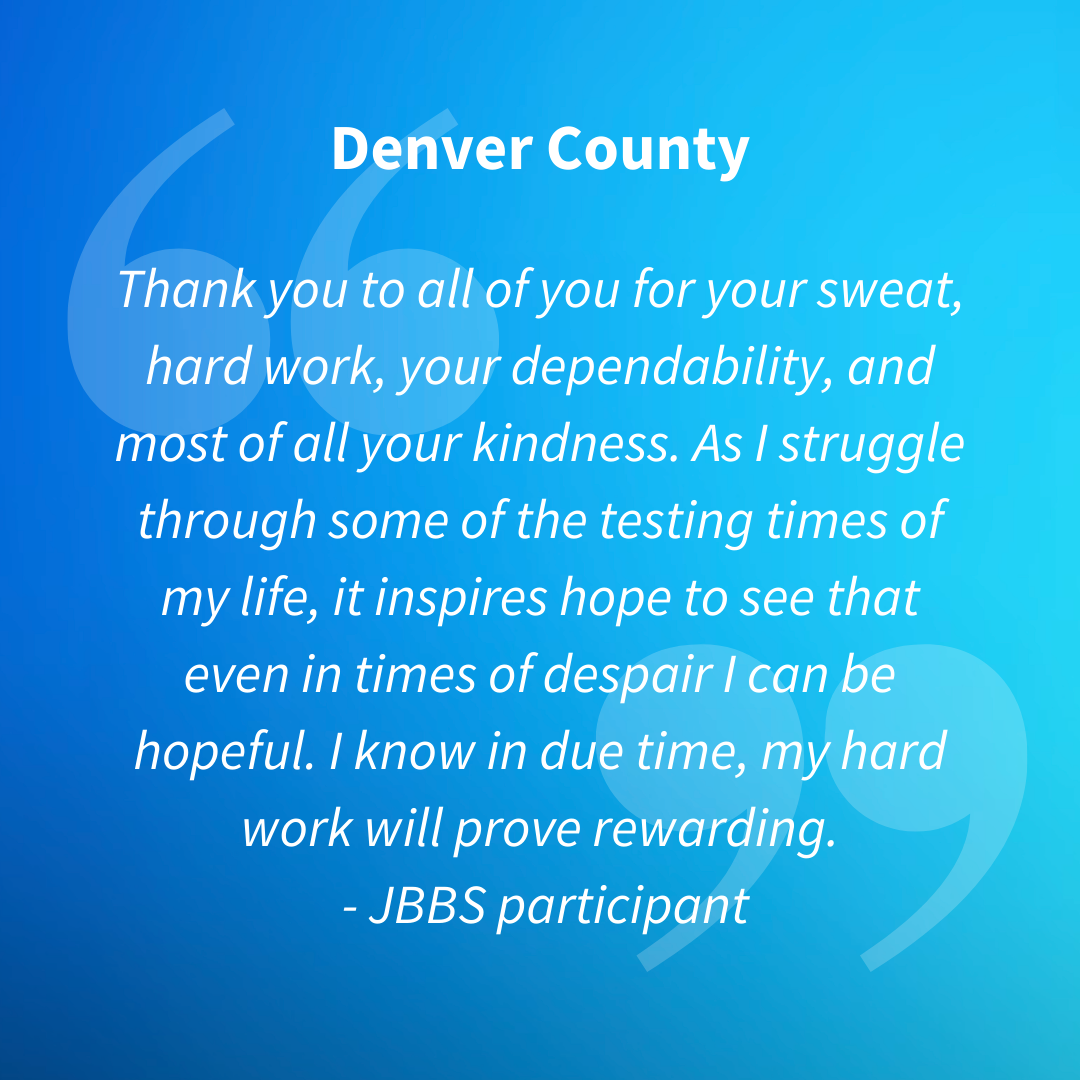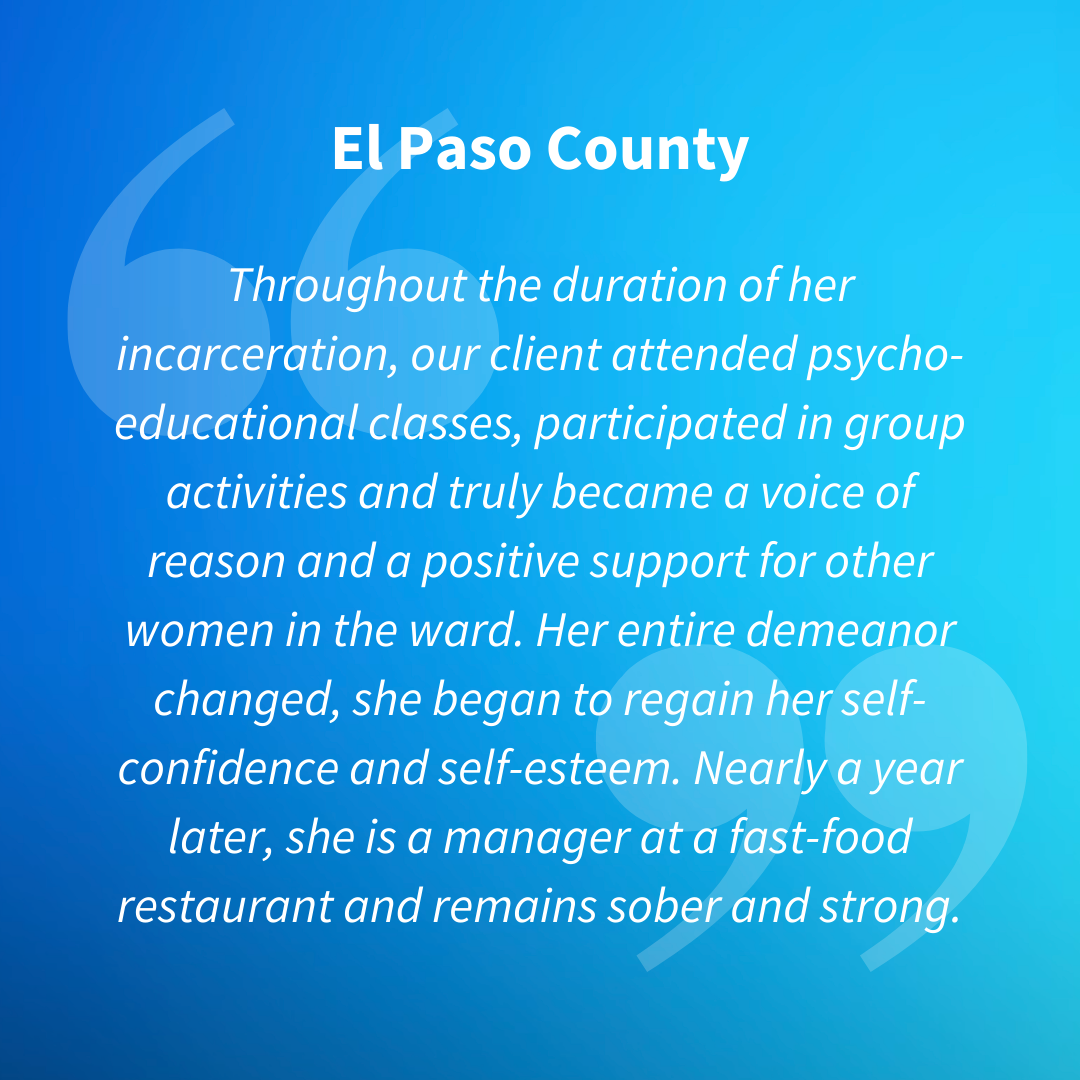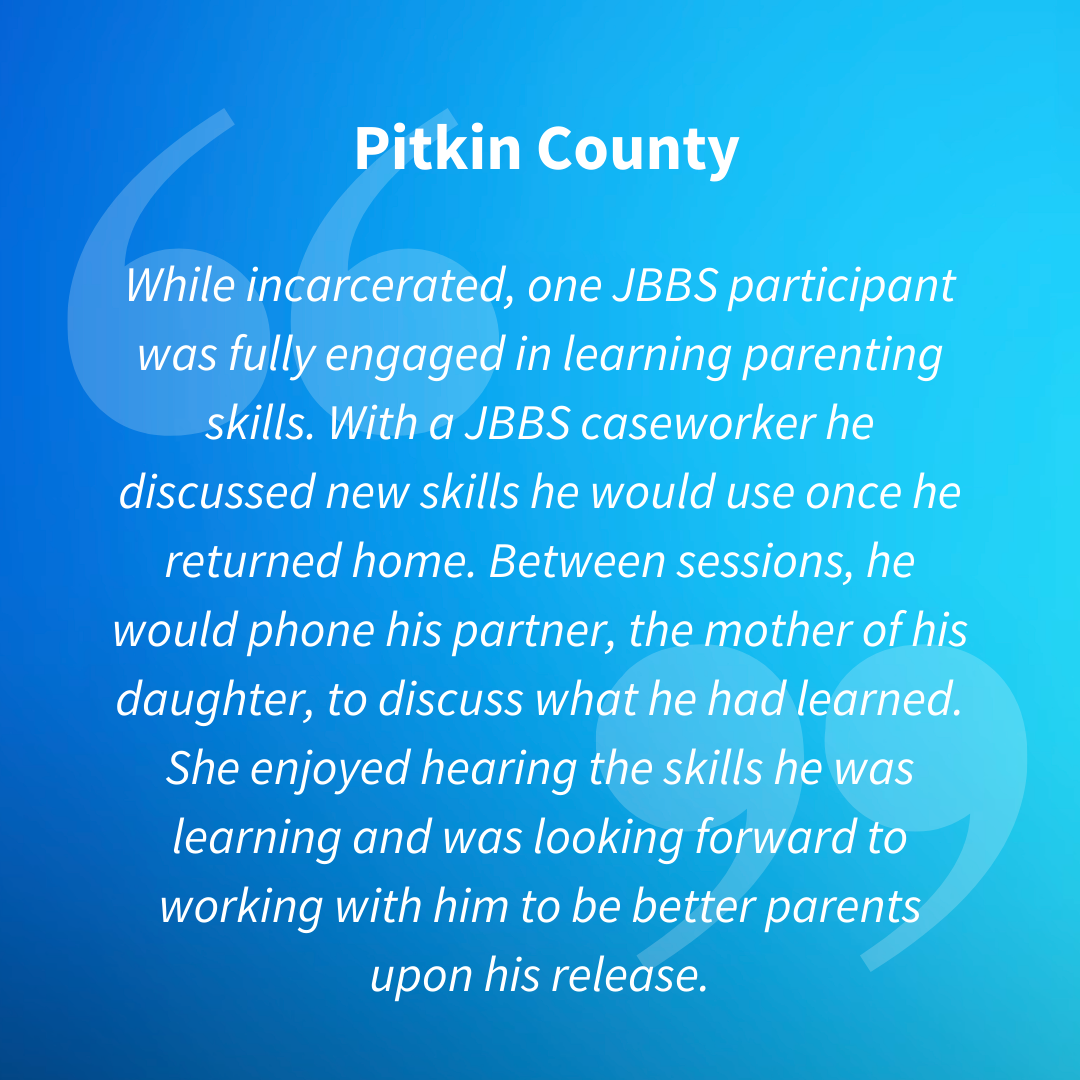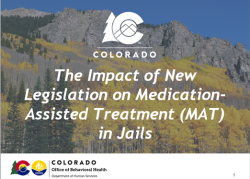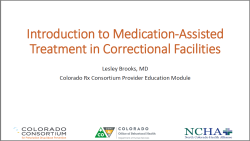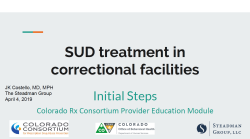Jail Based Behavioral Health Services
Connect with us!
The Criminal Justice team offers support to community partners through quarterly workgroup meetings, learning community sessions and roundtable discussions.
The Jail Based Behavioral Health Services (JBBS) Program has been operational since October 2011 with funding from the Correctional Treatment Cash Fund pursuant to C.R.S.18-19-103 (5)(c)(V). The goal of the JBBS Program is to provide appropriate behavioral health services to inmates while supporting continuity of care within the community after release from incarceration.
To carry out the JBBS program, sheriff departments may partner with local community provider(s) who can demonstrate the ability to provide services within the jail, and the capacity to provide or link individuals releasing from jail to free or low cost services in the community. This approach should result in shorter jail sentences and decreased recidivism through better identification and treatment of behavioral health needs.
Last updated: December 9, 2025
Download the JBBS Funding Breakdown
Download the JBBS SFY24 Annual Report
Download JBBS History (2011-Present)
Putting Coloradans on the Path to Recovery
Not only do JBBS programs provide vital behavioral health services to Coloradans, they also can reduce recidivism and increase chances for successful reentry. Read more than two dozen testimonials from JBBS programs throughout the state.
Victor King, the State Opioid Response Grant Peer Navigator Supervisor with Mental Health Partners, talks about his experience with Jail Based Behavioral Health Services and how the program put him on the road to recovery.
JBBS in the News
- Jail-based Behavioral Services seek to diminish revolving door effect at Moffat County Jail, Craig Press
- Pueblo jail program aims to lower recidivism, KOAA
- Summit County jail adds mental health navigator to help inmates transition to life after incarceration, Summit Daily
- New program helps inmates fighting drug addiction, 9News
About JBBS Programs
- Annual Reports
Download the 2024 Annual Report
Download the 2020 Annual Report
Download the 2019 Annual Report
- Substance Use Disorder Program
The JBBS substance use disorder program funds provision of evidence-based behavioral health services, with continuity of care extending into the community. Sheriff departments are recipients of these funds, either individually, or as multiple county sheriff departments as a partnership. In accordance with the legislation, all funds are used to provide behavioral health services for adults with substance use disorders or co-occurring substance use and mental health disorders.
Sheriff departments have partnered with local community providers who are currently licensed by OBH to provide services within the jail and have the capacity to provide free or low-cost services in the community to inmates upon release. Most programs have at least a clinician position to offer screenings, assessment and treatment in the jail and a case manager position dedicated to transitional care and a seamless re-entry in treatment services in the community. Treatment providers screen all inmates for presence of substance use disorders, mental health disorders, trauma and traumatic brain injury and identify inmates with active duty or veteran military status.
Participating Counties: Adams, Alamosa, Arapahoe, Archuleta, Baca, Bent, Boulder, Cheyenne, Clear Creek, Conejos, Crowley, Delta, Denver, Douglas, Eagle, Elbert, El Paso, Hinsdale, Garfield, Grand, Gunnison, Jefferson, Kiowa, Kit Carson, La Plata, Larimer, Logan, Moffat, Morgan, Montrose, Montezuma, Mesa, Otero, Ouray, Phillips, Pitkin, Pueblo, Prowers, Routt, San Miguel, Washington, Weld and Yuma.
- Funding
The Office of Behavioral Health was allotted $5,256,185 for the Jail Based Behavioral Health Services (JBBS) Substance Use Disorder (SUD) Program for FY 2018-19. The JBBS program supports county sheriffs in providing screening, assessment and treatment for substance use disorders and co-occurring substance use and mental health disorders to people who need such services while they are in jail. The program also creates partnerships for continuity of care in the community for individuals needing services upon release from jail. The is funded through HB 10-1352, and expanded in October 2012 through SB 12-163.
- Statewide Evaluation
This July 2018 JBBS program evaluation examined both process elements of how the program is implemented across the counties as well as the outcomes and impact of the services provided.
- Mental Health Services
In May 2018 the Colorado General Assembly passed Senate Bill 18-250, which allocated $5.1 million in additional funding to the JBBS program to address gaps in services for mental health disorder screening, assessment, diagnosis and treatment. The funds support psychiatric prescription services and the purchase of medications. In accordance with the legislation, all funds are dedicated to providing behavioral health services for adults (18 years of age and older) with mental health disorders or co-occurring substance use and mental health disorders. Per SB 18-250 priority was given to rural and frontier counties for mental health services funds.
Participating Counties: Alamosa, Clear Creek, Conejos, Crowley, Elbert, Garfield, Kit Carson, La Plata, Lincoln, Logan, Moffat, Montezuma, Montrose, Morgan, Otero, Prowers, Pueblo Rio Blanco, Routt, Summit, Washington, and Yuma Counties.
- Competency Enhancement Services
In May 2019, the Colorado General Assembly passed Senate Bill 19-223; legislation that mandates the provision of interim mental health services for individuals who have been court-ordered for inpatient competency restoration and who are waiting for admission to an inpatient bed. To compensate for these specialty services, SB 19-223 allocates funding to the Jail Based Behavioral Health Services (JBBS) program to address gaps in services in the jail for those with mental health disorders that are awaiting restoration services.
Competency enhancement funding is used to provide interim mental health services to individuals who are in jail and have been court-ordered to the Colorado Department of Human Services (CDHS) to receive competency restoration services. Funding is also to be used to provide mental health services to individuals who are returning to the jail after receiving restoration services at an Office of Behavioral Health (OBH) designated inpatient restoration facility. Coordination of services with the Forensic Support Team (FST) and Court Liaisons (Bridges) shall occur when a court order has been received for an evaluation and/or when an individual is identified to be in crisis by the jail at the time of booking or while incarcerated.
Participating Counties: Adams, Arapahoe, Boulder, Denver, Douglas, El Paso, Jefferson, Larimer, Mesa and Pueblo.
- Pre-Sentence Reentry Coordinator Services
In July 2019, the Office of Behavioral Health (OBH) was granted funds by the Correctional Treatment Fund Board for Pre-sentence Reentry Coordinator position(s) in select jails. This program shall provide services to individuals at county jails who are in need of behavioral health treatment and are on pre-sentence status. These positions will work to enhance and improve care coordination for individuals in county jails with shorter incarcerations (actual length to be determined by individual jails), which may prevent them from receiving more meaningful interventions by behavioral treatment staff. These positions are responsible for facilitating communication and collaboration between judicial and behavioral health systems.
Participating Counties: Arapahoe, Boulder, Denver, Douglas, El Paso, Grand, Jefferson, Larimer, and Pueblo counties.
- Medication-Assisted Treatment
Medication-assisted treatment (MAT) pairs anti-craving medications and therapy to treat OUD.
- Resources
MAT Policies and Protocol
Medication-Assisted Treatment (MAT) in the Criminal Justice System: Brief Guidance to the States - A brief provided by the Substance Abuse and Mental Health Services Administration.
Jail-Based Medication-Assisted Treatment -- Promising Practices, Guidelines and Resources in the Field from the National Commission on Correctional Health Care
Senate Bill 19-008 requires a county jail that receives funding through Jail-Based Behavioral Health Services (JBBS) to have a Medication-Assisted Treatment (MAT) policy in place on or before Jan. 1, 2020. Here is a sample MAT policy, protocol, and discharge interview. All of these were developed by the Steadman Group.- Training
Colorado Consortium for Prescription Drug Abuse
The Colorado Consortium for Prescription Drug Abuse has compiled many resources about Naloxone in Colorado and links to trainings.
National Sheriff's Association
The National Sheriff's Association released this guide on promising practices for jail-based MAT.
Webinars
The Impact of New Legislation on MAT in Jails
Presented Oct. 24, 2019This slide show was used during a live online training covering the requirements and previewing the expected impacts of new legislation and funding on OBH criminal justice initiatives (with an emphasis on opioid use disorder mandated through Senate Bill 19-008). OBH representatives also provided guidance on funding deadlines and next steps.
Introduction to MAT in Correctional Facilities
Presented March 22, 2019Dr. Lesley Brooks, Chief Medical Officer with Sunrise Community Health and Assistant Medical Director for North Colorado Health Alliance, presents on the unique benefits to providing treatment for substance use disorders (SUD) in correctional facilities. The presentation details the medications approved by the U.S. Food and Drug Administration and describes the basic pharmacology of medications used in MAT. The session also covers the National Commission on Correction Health Care recommendations for treatment of incarcerated people with SUD. Download the presentation slides.
Substance Use Disorder(SUD) Treatment in Correctional Facilities: Initial Steps
Presented April 4, 2019Dr. JK Costello, Senior Health Care Consultant with the Steadman Group, walks correctional facilities considering using MAT through initial planning and implementation steps. These include selecting goals for SUD treatment, determining the appropriate medications to reach the goals, evaluating local resources available to assist with treatment, and identifying considerations for assembling a team of law enforcement professionals and community members to realize the program. Download the presentation slides.
- Helpful links
- Open JBBS positions
The BHA will share open JBBS positions below. Please contact the county jail to learn more.
Resources for County Jails
- BHA resources
- JBBS trainings
- JBBS Monthly Contract Monitoring Tool and CiviCore Training
- JBBS CiviCore Pathways
- DMV ID Card Training
- GAIN presentation recording
Long Acting Injectables (LAI) Training
In August 2021, JBBS, Sheriffs, and other jail staff participated in a training to increase awareness about LAIs and their utility in preventing mental health decompensation. Following the training, jails participated in a pilot program discussion to learn more and secure resources to support LAIs. After pilot sites have been identified, training will be provided to the Community Mental Health Centers and other interested community partners in an effort to improve jail to community transitions.
- Roundtables
To better serve our stakeholders, BHA's Criminal Justice Team offers virtual Jail-Based Behavioral Health Services (JBBS) "Roundtables." These 50-minute sessions involve program staff who are available to answer questions related to upcoming deadlines and any operational and administrative changes. All sessions will be recorded and slide decks posted. Click on the following dates to access the recording files.
- Learning Community meeting recordings
- Quarterly Work Group meeting recordings
- JBBS forms and guides
- Legislation affecting JBBS programs
- Substance Use Disorder
SB20-1017: Concerning treatment of individuals with substance use disorders who come into contact with the criminal justice system.
SB19-008: Concerning treatment of individuals with substance use disorders who come into contact with the criminal justice system, and, in connection therewith, making an appropriation.
SB13-215: Concerning alternative healthcare practitioners, and, in connection therewith, enacting the "Colorado Natural Health Consumer Protection Act" to provide an exemption from State regulation for unlicensed complementary and alternative healthcare practitioners, require a person providing complementary and alternative health care services to disclose to clients the person's educational background and the nature of the services to be provided, and prohibit complementary and alternative health care practitioners from engaging in specified activities that only State-regulated health care professionals may perform.
- Mental Health
SB18-250: Concerning the provision of jail-based behavioral health services, and, in connection therewith, making an appropriation.
- Competency Enhancement
SB19-223: Concerning actions related to competency to proceed, and, in connection therewith, making and reducing an appropriation.
- HB 21-1211
HB 21-1211: Regulation Of Restrictive Housing In Jails
Beginning July 1, 2022, HB 21-1211 prohibits jails with a bed capacity of more than 400 beds from involuntarily placing individuals in restrictive housing if the individual meets certain conditions (please review the conditions below). Affected county jails include Adams, Arapahoe, Boulder, Denver, Douglas, El Paso, Jefferson, Larimer, Mesa, Pueblo and Weld.
The bill requires a medical or mental health professional to assess any individual placed in restrictive housing within 24 hours of placement. Jails must use an adequate screening tool to complete a health screening of each inmate when the inmate arrives at the jail.
The bill also requires jails to keep and maintain a record of certain data regarding each individual placed in restrictive housing and certain data regarding each individual with a mental illness or substance use disorder beginning January 1, 2022.
- Conditions that prohibit placing individuals in restrictive housing
The prohibition applies if:
- The individual is diagnosed with a serious mental illness or is exhibiting grossly abnormal and irrational behaviors, or breaks with reality or perceptions of reality indicating the presence of a serious mental illness;
- The individual has self-reported a serious mental illness or is exhibiting self-harm unless a licensed mental health professional or psychiatrist evaluates the individual and finds serious mental illness is not present;
- The individual has a significant auditory or visual impairment that cannot otherwise be accommodated;
- The individual is pregnant or in the postpartum period;
- The individual is significantly neurocognitively impaired by a condition such as dementia or a traumatic brain injury;
- The individual is under 18 years of age; or
- The individual has an intellectual or developmental disability.
The prohibition does not apply if:
- Any indication of psychological distress is present and the jail transferred the individual to a healthcare facility to receive treatment and the individual is refused treatment or is determined not to meet the criteria for admission by the healthcare facility; and
- The individual poses an imminent danger to themselves or others; and
- No other less restrictive option is available and the individual is not responding to ongoing de-escalation techniques.
- Requirements for restrictive housing
When an individual is placed in restrictive housing under the above circumstances, the local jail shall:
- Document the facts and circumstances that led to placing the individual into restrictive housing;
- Notify its medical or mental health professionals in writing within one hour of placing an individual in restrictive housing;
- Notify the individual's appointed or retained legal representative, designated emergency contact, or legal guardian within 12 hours of the individual's involuntary placement and removal in restrictive housing;
- At least every 15 minutes, check on an individual involuntarily placed in restrictive housing;
- Every 24 hours, assess the individual involuntarily placed in restrictive housing;
- Provide the individual a clear explanation of the reason the individual has been placed in restrictive housing, the monitoring procedures that the local jail will employ to check the individual, the date and the time, when the individual's next court date is, and the behavioral criteria the individual must demonstrate to be released from restrictive housing;
- Not hold the individual in restrictive housing for more than 15 days in a 30-day time period without a written court order; and
- Supply the individual with basic hygiene necessities; exchanges of clothing, bedding, and linen; access to writing letters or receiving letters; opportunities for visitation; access to legal materials; access to reading materials; a minimum of one hour of outdoor exercise 5 days a week outside of the cell; telephone privileges; and access to programs and services.
- Helpful links
- Resources for Veterans
- Resources for reentry
- Criminal justice resources
- Behavioral health resources
- Medication Resources
MMCAP Infuse: a national cooperative group purchasing organization (GPO) for government facilities that provide healthcare services.
- Traumatic brain injury (TBI) resources
- Client resources
- Hustle 2.0 - Self-directed, in-cell study program for incarcerated people
- Community Reinforcement and Family Training with Prevention (CRAFT-P)
- S.AF.E. (Sober AF Entertainment)
- Global Appraisal of Individual Needs (GAIN) Resources
GAIN Trainings
- GAIN Clinical Training (June 2024)
GAIN Office Hours
- June 25, 2025 GAIN Civicore Office Hours Recording
- April 30, 2025 GAIN Civicore Office Hours Recording
- January 29, 2025 GAIN Civicore Office Hours Recording
- December 4, 2024 GAIN Civicore Office Hours Recording
- September 25, 2024 GAIN Civicore Office Hours Recording
- August 28, 2024 GAIN Civicore Office Hours Recording
- August 14, 2024 GAIN Civicore Office Hours Recording
- August 7, 2024 GAIN Civicore Office Hours Recording
- July 10, 2024 GAIN Office Hours Recording
- State Opioid Response
- JBBS CiviCore Dashboard
The dashboard below has nine (9) windows that can be selected and viewed one at a time: 1. Map of Participating JBBS Counties, 2. JBBS Referrals and Admits over Time, 3. JBBS Rate of Return to Program within One Year, 4. JBBS Client Problem Severity at Admission, 5. JBBS Admission Rate by County, 6. JBBS Successful Discharge Rate by County, 7. JBBS Client Demographics, 8. JBBS Admission Rates by Demographic, and 9. JBBS GAIN Completion Rate for Admitted Clients.
The default time period for most windows is July 1, 2024 to June 30, 2025 (i.e. State Fiscal Year 2025). The date range in those windows can be changed using the slider in the top right-hand corner of the screen. In some windows, the unit of measurement for the data can be changed using the “Date Granularity” option to be Day, Week, Month, Quarter, or Year. In the One Year Rate of Return to JBBS window, the default time period is 2012 to 2024 and the dates cannot be changed. Most windows can be filtered by Age, Gender, or Race/Ethnicity of JBBS clients, by Jail Size (large, medium, small, or extra small), or by County by using the tools on the right-hand side of the screen.
The “jail size” categories are based on the average daily population (ADP) of the facility. The size categories are as follows: 1 = Large (ADP of 500 or more), 2 = Medium (ADP of 100-499), 3 = Small (ADP of 25-99), and 4 = Extra Small (ADP of 0-24). When hovering over a county using your cursor on the Map of Participating JBBS Counties, a pop-up window will list the county name, ADP, number of jail beds, jail size category, population of the county, and the number of JBBS clients in the timeframe specified.
Clients with an “admitted” status were referred to JBBS and were admitted based on their eligibility and willingness to participate in the program. Clients with a “not admitted” status are those that were referred to the JBBS program but were not admitted because of administrative or disciplinary reasons, or because they chose not to participate in the program. Clients with a “successful” discharge status are those that successfully completed the treatment plan laid out for them by JBBS staff up to the point of the client's release or transfer to another facility. Clients with an “unsuccessful” discharge status are those that did not complete the treatment plan laid out for them by JBBS staff before their release or transfer because of disengagement, or administrative or disciplinary issues.
Beginning on July 1, 2024, all admitted clients are required to take the Global Appraisal of Individuals Needs (GAIN) 3.2 Lite assessment. The GAIN assessment asks numerous questions about mental and physical health, crime and violence, risk behaviors, stress factors, substance use and abuse, and homelessness. Beginning on July 1, 2025 the GAIN 3.2 Lite assessment was updated to include questions related to traumatic brain injury. The Client Problems at Admission window presents the aggregate results of the GAIN assessment for all admitted JBBS clients who took the assessment. The GAIN Completion Stats window shows the percentage of clients admitted to JBBS in each facility that completed at least one (1) GAIN assessment.
Data Integrity Disclaimer: Each facility submits their own data for contract monitoring purposes. That data is utilized for the dashboard presented. As a result, the integrity and accuracy of submitted data can vary from facility to facility. BHA continues to work with each facility to identify any issues with data integrity and submission, and to resolve those issues as needed.
If you have questions, please contact: alexander.clayton@state.co.us.
